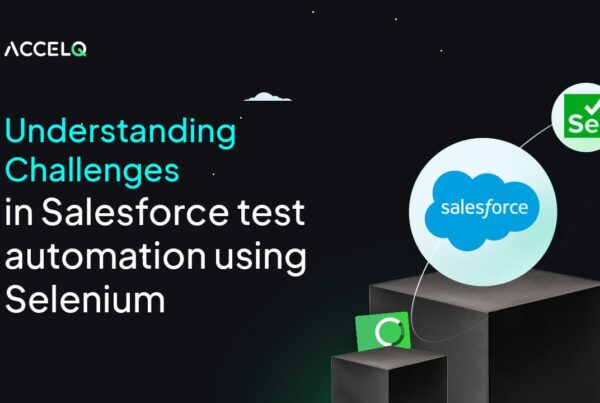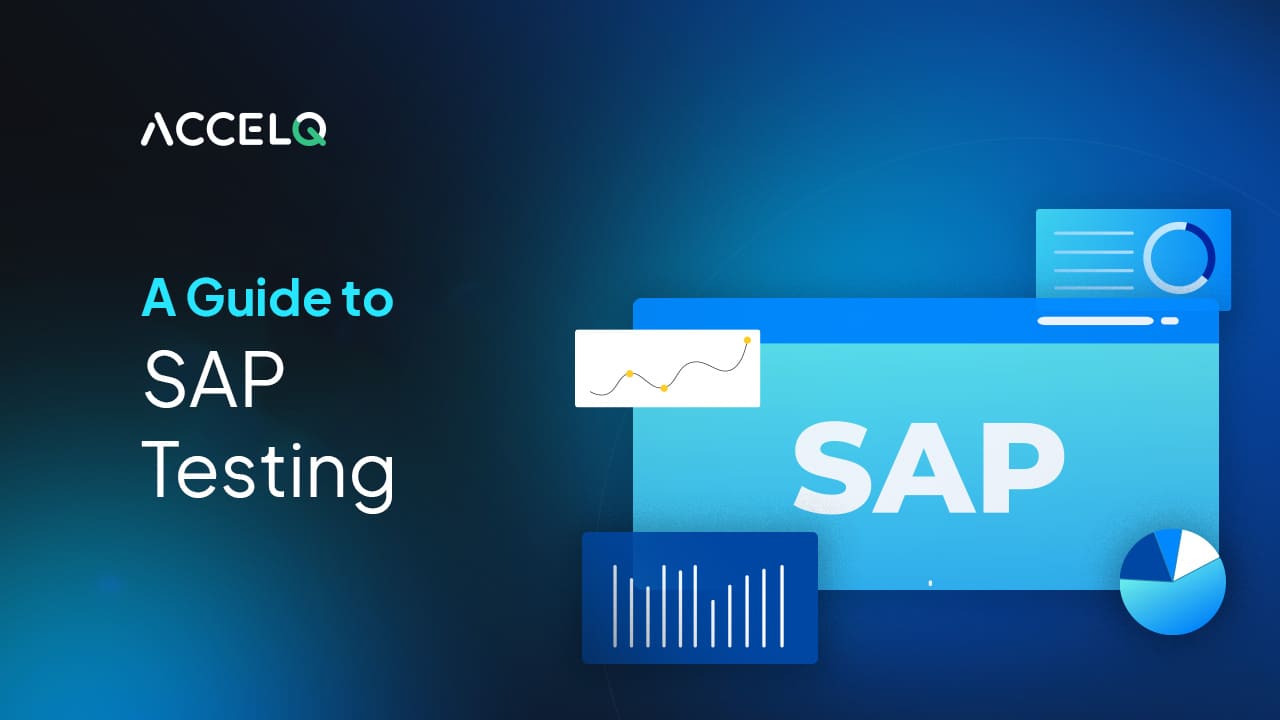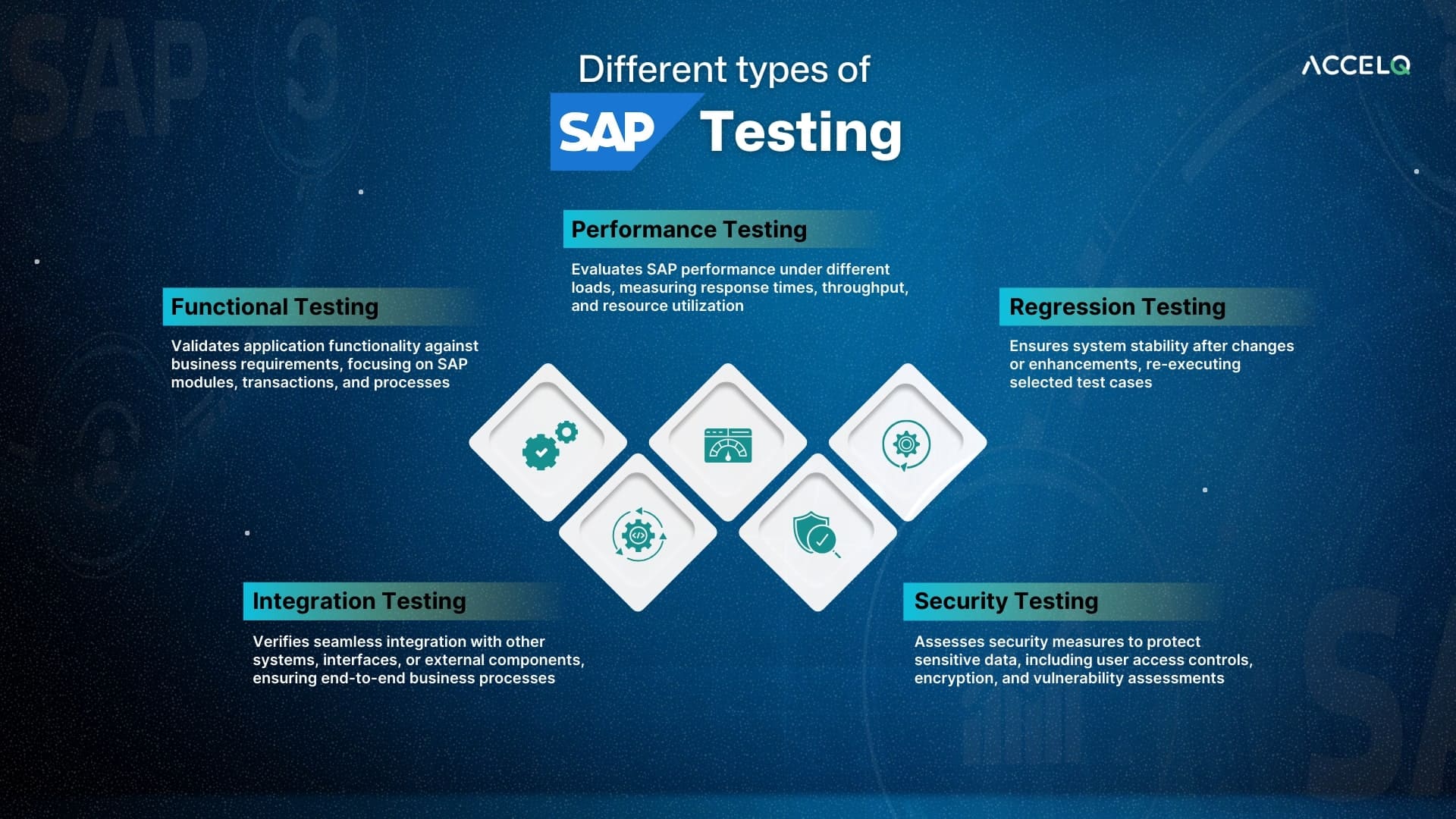A Guide to SAP Testing and the Need for Test Automation

SAP’s extensive suite of products covers every aspect of an organization, from ERP, finance, CRM, supply chain, and HR to many more critical applications for business operations, so it becomes imperative that SAP testing is conducted reliably and efficiently. These solutions require considerable customization and must be tested frequently and thoroughly to ensure that any new update, configuration, or integration does not introduce risk into the system the hard way.
SAP testing ensures system functionality and a well-thought-out investment and strategy to minimize expensive downtime, which could affect user satisfaction and the stability of operations. Given SAP systems’ complexities and constantly changing evolution, more than manual testing is required.
SAP test automation has become one of the main go-to’s for enterprises, giving them quicker, more accurate regressing tests, better data validation, and quicker identification of issues ahead. This allows organizations to attain a uniform, scalable testing solution that meets SAP’s demands, ensuring secure, error-free operation and a seamless user experience.
What is SAP testing?
SAP testing entails understanding the SAP software architecture, configurations and customizations made to the existing deployment and proper knowledge of the system’s business processes. Usually, experienced testers work with various tools and technologies with the assistance of a large community of users who collaborate and share insights, to arrive at the right approach of the SAP testing process.
Since SAP applications are not specific to a single domain, testing cannot happen in a single direction. In the SAP enterprise stack, we work with native applications, mobile applications, web applications, etc., and hence, the testing process is split across multiple domains used for specific application types or across various ones.
Different types of SAP Testing
1. Functional Testing
Functional Testing for validation of application functionality against business requirements. This tests individual SAP modules, transactions, and processes to ensure proper execution and expected outcomes.
2. Integration Testing
Integration Testing verifies the seamless integration of SAP applications with other systems, interfaces, or external components. This tests data exchange, communication protocols, and end-to-end business processes across integrated systems.
3. Performance Testing
Performance Testing evaluates the performance of SAP applications under different loads, stresses, and scalability scenarios. This type of SAP testing measures response times, throughput, and resource utilization to ensure optimal system performance.
4. Security Testing
Security Testing assesses the security measures implemented within SAP applications to protect sensitive data and prevent unauthorized access. Tests user access controls, encryption, authentication, and vulnerability assessments.
5. Regression Testing
Regression Testing validates that changes or enhancements made to SAP applications do not negatively impact existing functionalities. This re-executes selected test cases to ensure the stability of the system after modifications or upgrades.
Organizations can mitigate risks, improve quality, and enhance their SAP systems’ overall reliability and performance by incorporating these testing types into the SAP application development and maintenance lifecycle.
Best practices of SAP testing
- Switch to test automation from the very start, to save time and expenses by carrying out quick execution of repetitive tasks like SAP Regression testing.
- Carefully consider risk-based testing, as businesses usually focus on segments that can cause changes in another in case of iterations. While this can help manage costs, there interconnectivity risks are high.
- Shift Left or testing early in the project’s test lifecycle is ideal as SAP implementations have inherently high complexity and inter-dependencies. There is a demand for greater than normal clarity of process flows and test planning at an early stage.
- Integrate testing with CI/CD with SAP testing should start soon after the code is ready for deployment. Integrating CI/CD when integration-test readiness is reached helps achieve trust in the product and shorten delivery cycles.
The need for SAP test automation
A paradigm shift in the way testing happens for SAP implementations involves fostering the concept of SAP test automation. SAP test automation involves leveraging SAP testing tools and platforms, along with SAP Testing best practices, to enable a seamless and automated testing experience for digital systems. Development and testing teams can quickly verify and validate customizations and new feature development initiatives through SAP test automation.
Let us sum this up now:
- SAP environments are complex, modular and function with integrations. Manual testing can be time-consuming and erroneous.
- SAP automated testing reduces the time and effort required for repetitive and time-consuming tasks.
- Since test automation allows execution of more test cases simultaneously; it validates multiple business processes, user interactions, and system integrations, improving test coverage.
- It is possible to automate tedious and repetitive tasks, hence more test scenarios can be covered in less time.
- An intuitive, no-code test automation platform for SAP increases your test speed, reduces developer dependency and results in more agile processes.
- Test automation brings about faster feedback cycles and shorter release cycles.
- Continuous testing can be implemented with test automation, where tests can be executed in parallel with development efforts, providing prompt feedback to developers and helping them fix bugs and deployments faster.
Build a competitive SAP test automation strategy with ACCELQ
Though SAP provides some built-in testing tools like eCATT and TAO, more is needed, especially on a broad spectrum for testing, i.e., UI to API. Cloud-based SAP Test automation offers scalability as a solution that integrates the extensive benefits of a cloud environment in terms of hosting test beds and data, coupled with automating complicated testing processes. ACCELQ AI-powered, codeless automation takes it further up a notch, providing fully driven SAP test automation as well as regular UI workflow testing for newer versions.
ACCELQ boosts this effect by another factor due to self-healing capabilities that automatically adjust the automation in case of changes on the system side, greatly boosting ROI with minimal maintenance. Get in touch with us to learn more about creating an SAP testing strategy that resonates with your business’s digital ambitions and ensures seamless onboarding of the latest innovative systems over time.
Geosley Andrades
Director, Product Evangelist at ACCELQ
Geosley is a Test Automation Evangelist and Community builder at ACCELQ. Being passionate about continuous learning, Geosley helps ACCELQ with innovative solutions to transform test automation to be simpler, more reliable, and sustainable for the real world.
Discover More
 Should you choose an Open-Source Framework for Oracle Cloud Testing?
Should you choose an Open-Source Framework for Oracle Cloud Testing?
Should you choose an Open-Source Framework for Oracle Cloud Testing?
 Understanding challenges in Salesforce test automation using Selenium
Understanding challenges in Salesforce test automation using Selenium

































